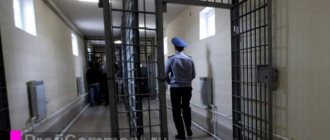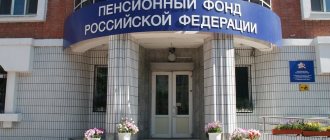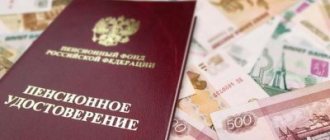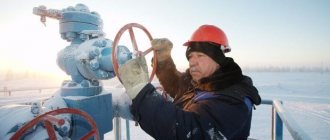According to statistics, at the beginning of 2020, there were just under 44 million people living in Russia who are eligible to receive pension payments. This is a very impressive figure relative to the entire population in the country. However, these statistics do not take into account recipients of military pensions.
In general, pensioners are usually considered to be elderly citizens who receive cash payments based on their length of service. In this case we are talking about recipients of an insurance (formerly labor) old-age pension.
Indeed, the overwhelming majority are among pensioners. However, there are other types of material and monetary support that certain categories of citizens can count on. In particular, now we will talk about the features of the state pension, aspects of the assignment of which are regulated by the relevant federal law.
State pension provision
F3 166 was adopted in accordance with the Constitution of the Russian Federation. Pensions are assigned and paid based on the law. The law may be amended, changed and supplemented to take into account inflation. The Government of the Russian Federation establishes the procedure for exercising the rights to receive pensions, the conditions for assigning pensions for all citizens, the categories of which are indicated in the law.
According to Art. 27 previously accrued pensions before the entry into force of the New Law are preserved and indexed in accordance with this law. If the previously accrued pension amount exceeds the norm specified in this law, then it is also paid in the same high amount.
Citizens who previously received a pension before the adoption of the new law upon reaching the ages of 60 and 65 years for women and men can receive a pension in the same amount and in the same manner.
Based on Art. 28 defines the procedure for payments for foreign citizens living in the country with a residence permit, or due to service in the Russian Federation. Pensions are also provided for their family members.
The provisions of the law apply to foreign citizens performing military service in the ranks of the armed forces of the Russian Federation, other troops, military units, as well as to members of their families.
Changes to the pension reform (Federal Law No. 350 of October 3, 2018) + retirement table
On October 3, 2020, Federal Law No. 350-FZ of October 3, 2018 “On amendments to certain legislative acts of the Russian Federation on the appointment and payment of pensions” was adopted; it comes into force on January 1, 2020, part of the amendments on January 1, 2025.
The retirement age for men will be increased to 65 years , and for women - to 60 years (that is, the working age will increase by 5 years for both sexes ). The increase will occur in stages - in increments of one year per year , however, in the first two years of the transition period (2019 and 2020), citizens who, according to the old legislation, should have reached retirement age in 2019-2020, will be able to receive payments ahead of schedule ( by 6 months before the new retirement age, see table).
Also changed:
- Possibility of early retirement for mothers of many children . Women with three children will be able to retire three years earlier than the established period, if four children - four years earlier , for women with five or more children the possibility of retiring at 50 years . (Article 32 of Federal Law No. 400 dated December 28, 2013 “On insurance pensions”)
- Benefits for citizens who, according to the old legislation, were supposed to retire in the next two years - the right to apply for a pension six months earlier than the new retirement age . (Clause 6.7 Article 30 Federal Law No. 350)
- Establishing administrative or even criminal liability for dismissing employees near retirement age or refusing to hire such citizens because of their age.
- Increasing the maximum amount of unemployment benefits for citizens of pre-retirement age from 4,900 rubles to 11,280 rubles , starting from January 1, 2020, the payment period will be set at one year.
- Leave the current conditions for granting pensions for the indigenous peoples of the North unchanged .
- Introduction of a 25 percent supplement to the insurance pension for non-working pensioners living in villages whose experience in agriculture is at least 30 years. (Part 14 Article 17 Federal Law No. 400 dated December 28, 2013 “On insurance pensions”)
- Reducing the length of service that gives the right to early retirement by three years, that is, for women it will be 37 years , and for men - 42 years . (Part 1.2 of Article 8 of Federal Law No. 400 of December 28, 2013 “On Insurance Pensions”)
- Maintaining all federal real estate benefits, as well as tax benefits in effect as of December 31, 2018, throughout the transition period.
Special experience
The special length of service that gives the right to early retirement does not change for citizens working in the Far North and similar areas. The generally established retirement age will be gradually increased by 5 years for men and women (up to 60 and 55 years, respectively).
The special length of service that gives the right to early retirement (ranges from 25 to 30 years) does not change for teaching and medical workers. At the same time, the deadline for applying for a pension will be gradually postponed.
Raising the retirement age for civil servants
From 2020, the age began to gradually increase annually by six months to 65 years for men and 63 years for women.
From January 1, 2021, the increase in the retirement age for civil servants will increase - one year per year.
Social pensions
The law provides for changes related to the age of retirement of social pension. Citizens who have not worked or have not acquired the full length of service required to receive an insurance pension will be assigned a social pension not at 60 (women) and 65 years (men), but at 65 and 70 years, respectively. These changes will also be carried out gradually. Citizens with significant disabilities have the right to apply for a disability determination and, if the decision is positive, receive a social disability pension (regardless of age). Disability pensions are retained in full. For persons who have lost their ability to work, these pensions are assigned regardless of age when the disability group is established.
Guarantees for citizens of pre-retirement age
Administrative and criminal liability is introduced for employers for dismissing workers of pre-retirement age, as well as for refusing to hire because of their age. In addition, the employer is obliged to annually provide employees of pre-retirement age with 2 days of free medical examination while maintaining their wages.
From January 1, 2020, the maximum amount of unemployment benefits will increase from 4,900 rubles to 11,280 rubles - the period of such payment is set at one year.
Pension points (coefficients)
The cost of one pension coefficient in 2020 is set at an amount equal to 87 rubles 24 kopecks, in 2020 - 93 rubles 00 kopecks, in 2021 - 98 rubles 86 kopecks, in 2022 - 104 rubles 69 kopecks, in 2023 - 110 rubles 55 kopecks, in 2024 - 116 rubles 63 kopecks. (Clause 7, Article 10, Federal Law No. 350)
Formula for calculating old-age insurance pension
SP = IPC * SPK + (EF * KvEF),
where SP is the amount of the old-age insurance pension;
IPC - individual pension coefficient;
SPK - the cost of one pension coefficient (point) as of the day from which the old-age insurance pension is assigned (SPK for 2020 = 81.49 rubles), (SPK for 2020 = 87.24 rubles);
FV - fixed payment to the insurance pension (FV for 2020 = 4982.90 rubles), (FV for 2020 = 5334.19 rubles) From January 1, 2019 to January 1, 2025, indexation of the size of the fixed payment to the insurance pension will not be made (Federal Law dated October 3, 2018 N 350-FZ)
The amount of the fixed payment to the old-age insurance pension provided for in Part 1 of Article 16 of the Federal Law of December 28, 2013 No. 400-FZ “On Insurance Pensions”, from January 1, 2019 is established in an amount equal to 5334 rubles 19 kopecks, from January 1, 2020 year - 5686 rubles 25 kopecks, from January 1, 2021 - 6044 rubles 48 kopecks, from January 1, 2022 - 6401 rubles 10 kopecks, from January 1, 2023 - 6759 rubles 56 kopecks, from January 1, 2024 - 7131 rubles 34 kopecks .;
KvFV - coefficient of increase in EF, applied when delaying the application for an insurance pension.
The IPC is determined by the formula:
IPK = (IPKs + IPKn) * KvSP,
where IPC is the individual pension coefficient as of the day from which the old-age insurance pension is assigned;
IPKs - individual pension coefficient for periods that occurred before 01/01/2015. (The IPKs value consists of the amount obtained by dividing the size of the monthly payment to a citizen of the insurance part of the labor pension as of December 31, 2014, without taking into account the fixed base amount and the funded part of the pension by the cost of one pension coefficient (point) (SPKk), as well as the sum of the coefficients determined for each calendar year of other periods that occurred before 01/01/2015 (NPi), divided by coefficients for calculating the amount of the old-age insurance pension equal to 1);
IPKn - individual pension coefficient for periods occurring from 01/01/2015, as of the day from which the old-age insurance pension is assigned. (The value of IPKn consists of the sum of individual pension coefficients and the sum of coefficients determined for each calendar year of other periods counted towards the insurance period (NPi), divided by coefficients for calculating the amount of the old-age insurance pension equal to 1);
KvSP is the coefficient for increasing the IPC, applied when deferring the application for an insurance pension.
Coefficients of other periods included in the insurance period for calculating the old-age insurance pension
Coefficient for a full calendar year of another period counted towards the insurance period
- Period of military service under conscription - 1.8
- The period of care of one of the parents for the first child until he reaches the age of one and a half years is 1.8
- The period of care of one of the parents for the second child until he reaches the age of one and a half years - 3.6
- The period of care of one of the parents for the third or fourth child until each of them reaches the age of one and a half years - 5.4
- The period of care provided by an able-bodied person for a group I disabled person, a disabled child or a person who has reached the age of 80 years - 1.8
- The period of residence of spouses of military personnel undergoing military service under a contract, together with their spouses, in areas where they could not work due to lack of employment opportunities, but not more than five years in total - 1.8
- The period of residence abroad of spouses of employees sent to diplomatic missions and consular offices of the Russian Federation, permanent missions of the Russian Federation to international organizations, trade missions of the Russian Federation in foreign countries, representative offices of federal executive bodies, state bodies under federal executive bodies or as representatives of these bodies for abroad, as well as to representative offices of state institutions of the Russian Federation (state bodies and state institutions of the USSR) abroad and international organizations, the list of which is approved by the Government of the Russian Federation, but not more than five years in total - 1.8
- The period during which persons who were unjustifiably brought to criminal liability and subsequently rehabilitated were temporarily suspended from office (work) in the manner established by the criminal procedural legislation of the Russian Federation - 1.8
- The period of service and (or) activity (work) provided for by Federal Law dated 06/04/2011 N 126-FZ “On pension guarantees for certain categories of citizens” - 1.8
If the periods of care coincide in time, the coefficient for the full calendar year of these periods is determined as the sum of the coefficients.
If the duration of another period is less than a full year, the coefficient is determined based on the actual duration of the corresponding other period. In this case, one month of another period is 1/12 of the coefficient for a full calendar year, and one day is 1/360 of the coefficient for a full calendar year. Calculations for other categories of citizens and other types of pensions will be carried out later.
State pension system
Federal state law adopted by the Duma on November 30, 2001. The Federation Council approved the law on December 5, 2001. The law consists of:
- general provisions indicated in Articles 1-6
- conditions for the assignment of pensions to persons in state employment. provision in Art. 7-13
- state pension amounts pension provision in Art. 14-18
- for receiving a pension after completing the length of service, taking into account the average monthly earnings in Art. 19-21
- indexation of pensions for certain categories of citizens, payments, delivery of pensions are indicated in Articles 22-25
- the procedure for the entry into force of this law of the Russian Federation in Art. 26-28 F3 166.
Description of 166 Federal Law
The Federal Law on State Pension Provision in the Russian Federation was adopted by the State Duma on November 30, 2001, and approved by the Federation Council on December 5, 2001. It was last amended on July 1, 2020. 166 Federal Law has six chapters, 28 articles and one appendix. This law defines the rights of citizens to receive a pension, describes the processes for obtaining it and the conditions that must be met to receive it. Law No. 141 also contains some aspects of current information. More about this here:
Contents of Federal Law 166 on pensions:
- Chapter One describes the general provisions of the law. Other acts and laws regulating the sphere of pension provision and the terms and concepts used in the law and their definitions are described. A list of persons entitled to receive a pension in the Russian Federation is given, and the categories of pension provision are described. Methods of financing by the state and processes for increasing or reducing expenses for pensions in accordance with regulations of the Government of the Russian Federation;
- Chapter number two describes the conditions for granting a pension for each category of persons, including civil servants, disabled and incapacitated citizens, astronauts and their families, citizens affected by radiation or man-made disasters and their families, flight test personnel, participants in the Great Patriotic War. Patriotic War, military personnel and their families, awarded the badge “Resident of besieged Leningrad.” The procedure by which a citizen's disability is determined is described. Situations for receiving a pension if a family has lost its breadwinner are also described;
- In the third chapter. the amount of funds in the event of an appointment for a person to receive a pension has been formalized. Each category of persons listed above is described;
- In ch. four described the length of service and length of service. The process of calculating a citizen’s pension based on average monthly earnings and length of service is described;
- The fifth formalizes the indexation of pension provision, the process of payment and delivery of funds to a citizen. The deadlines for which the state determines the size of the population’s pension and makes changes are given. The process of recalculation and payments, methods of delivering a pension to a citizen are described in cases where a person is not able to independently receive funds at issuing points;
- The sixth chapter describes the procedure for the entry into force of this Federal Law. The pension has been preserved at the same level as previous years. The system for receiving funds by foreign citizens who served in military service on the territory of the Russian Federation is described. Additional provisions and conclusions of the law are given.
The appendix to the law contains a table listing the required length of service in state or municipal bodies to receive a long-service pension.
Also read about the latest changes to Federal Law 131 at the link:
Kinds
State pension payments are distinguished by type:
- By old age after reaching a certain age established by law
- If you receive injuries and injuries, and ultimately disability. For groups 1,2,3, the corresponding pension amount is fixed
- For years of service when working in a specific profession associated with danger and special conditions for its implementation. This category of citizens includes cosmonaut pilots, civil servants, military personnel
- For the loss of a breadwinner in the event of the death of a relative (mother, father) who is dependent on disabled children who have not reached the age of majority
- By social factors: loss of a breadwinner, old age, disability.
If, upon reaching retirement age, a person has the right to receive a pension for several points at once, for example, disability and reaching age, then he chooses one of the pensions at will. In the future, he may well change his decision.
Latest amendments
The latest amendments to the law on pension provision for citizens of the Russian Federation were made on July 1, 2020, with the adoption of Federal Law No. 148. According to these changes in article two, in the seventh paragraph the phrase “federal state security authorities” was changed to the words “state security authorities (federal authorities state protection)".
You may be interested: Federal Law 143 in the new 2020 edition is here:
According to the third article of the described law, in addition to ordinary citizens of the Russian Federation, pensions can be received by:
- Persons injured during military service. They are entitled to a disability pension and an old-age insurance pension;
- Members of families whose cosmonaut relative died. Such persons are entitled to a survivor's pension;
- Participants in the Great Patriotic War have the right to receive a disability and old-age pension;
- The pension is accrued in the same way as for participants of the Second World War, citizens who received the badge “Resident of besieged Leningrad”;
- Mothers and fathers of persons who served in military service and were injured or died are entitled to receive funds. Parents are entitled to survivor benefits;
- Wives whose spouses were injured or died during hostilities or conflicts are entitled to receive a survivor's pension;
- Any families that have lost their breadwinner also have the right to receive money upon presentation of evidence of relationship to the relevant authorities.
The processes for receiving funds by persons with several categories of pension coverage are also described. One citizen has the right to receive a pension for the loss of a breadwinner, for old age and for long service, etc.
Useful information about Federal Law 123 at the link:
The seventh article describes the conditions and requirements for receiving a pension by federal government employees. The amount of funds and length of service for employees are determined in the appendix of this Federal Law on the State. pensions. Civil servants have the right to receive a long service pension along with disability and old age benefits.
Pensions are not paid to such persons during the period of work in:
- State Service of the Russian Federation;
- Interstate or intergovernmental body;
- State service of the Russian Federation when replacing another person;
- A municipal body or when replacing another person in a municipal body;
- State body of a constituent entity of the Russian Federation.
Article 7.2 describes the system for accruing and receiving funds by citizens who participated in testing flight equipment. Persons who participated in the research and testing of serial aviation equipment, parachute and aerospace equipment, and aeronautical equipment receive a long-service pension only if they have a work experience of 25 years for men and 20 years for women. In situations where a citizen left his place of work for health reasons, the length of service is reduced to 20 years for men and 15 years for women. Positions, amount of funds and calculation of the period of work are regulated by the Government of the Russian Federation.
You may be interested in: the law banning smoking in public places 2020.
Article number 11 of the law on social pensions describes the conditions and requirements for calculating funds to disabled citizens. In accordance with this article, the following are entitled to receive a pension:
- Disabled since childhood or persons who received 1, 2 or 3 disability groups;
- Citizens of the Russian Federation who have reached the age of 65 years for men and 60 years for women. Foreign persons residing in Russia and meeting the conditions described above;
- Parents with disabled children in the family;
- Citizens belonging to the categories of small peoples of the North and living in the territories of the peoples of the North, who have reached the age of 55 years for men and 50 years for women;
- Citizens under 18 years of age, minors who have lost one or both parents, and full-time students in educational institutions.
The listed citizens may also be provided with a pension for the loss of a breadwinner, old age or disability.
Dimensions
The size of the pension directly depends on the level of salary for all years of work, length of service:
- Citizens who served the state receive 45% of the average salary. After 16 years of service, seniority is accrued, the payment increases by 3% per year, but the amount should not exceed 75%. The amount of the long-service pension is calculated taking into account the deduction of the insurance pension.
- For military service, but not reaching high ranks, also in the event of their death, according to Law No. 166, relatives of deceased or killed military personnel receive a pension. The payment amount depends on the military status. The accruals provided for by other laws when a former military man receives disability vary from 150 to 300% of the total social pension. Also, the amount of payments will depend on the assigned disability group received during service; in the event of the loss of a breadwinner - families receive a military pension in the amount of up to 200% of the total social pension. In case of death due to illness, the payment amount will be 150%.
- Participants in the Great Patriotic War, survivors of the siege of Leningrad, who later became disabled , receive social benefits. assistance in the amount of 250% for group 1, for group 2 -200%, for group 3 -150%.
- Citizens who suffered as a result of the disaster , from radiation, Chernobyl victims receive social benefits. assistance in the amount of 200-250%, upon recognition of disability - 250%, in the event of death, dependents receive a pension in the amount of 250%, orphans, children and all others - 150%.
- Cosmonauts receive a pension in the amount of 55% of their salary ; after 26 years, length of service is accrued at 3% per year, but not more than 86%
- Test pilots receive a pension, the amount of which depends on the duration of flights and length of service. Social limit benefits – 1300%.
- Pensioners receive social benefits. assistance: women upon reaching 50 years of age, and men upon reaching 55 years of age - 3,626 rubles. per month, also disabled people of group 2 and children of a deceased parent.
Disabled children and those who received group 1 in childhood receive 8,704 rubles.
Disabled orphans of the 1st group receive 7,253 rubles from childhood, disabled people of the 1st group receive 3,082 rubles.
Residents of the Far North and those equivalent to them, as well as those with dependent children, receive a larger pension; to compensate for inflation, the amounts for these categories of people are indexed.
Seniority
If the work experience is completed, then pension payments are accrued. Experience includes:
- hours worked by year
- years of military service, in particular being in the army
- years for mothers on maternity leave to look after young children (fathers also have this right)
- years of caring for a disabled person of group 1.
Also taken into account are the periods of time registered as unemployed and other periods specified in Law 166 of the Russian Federation.
Payments
The pension is paid monthly. For the current month, for example, when a pension for January is calculated, pensioners will receive it in the same month. There are some peculiarities in payments when citizens live, for example, on social security or when traveling outside the country for permanent residence.
Deductions from pensions are possible if there are fines or alimony obligations. Relatives of pensioners can receive unpaid funds after the death of the pensioner on the basis of a death certificate upon entry into inheritance.









